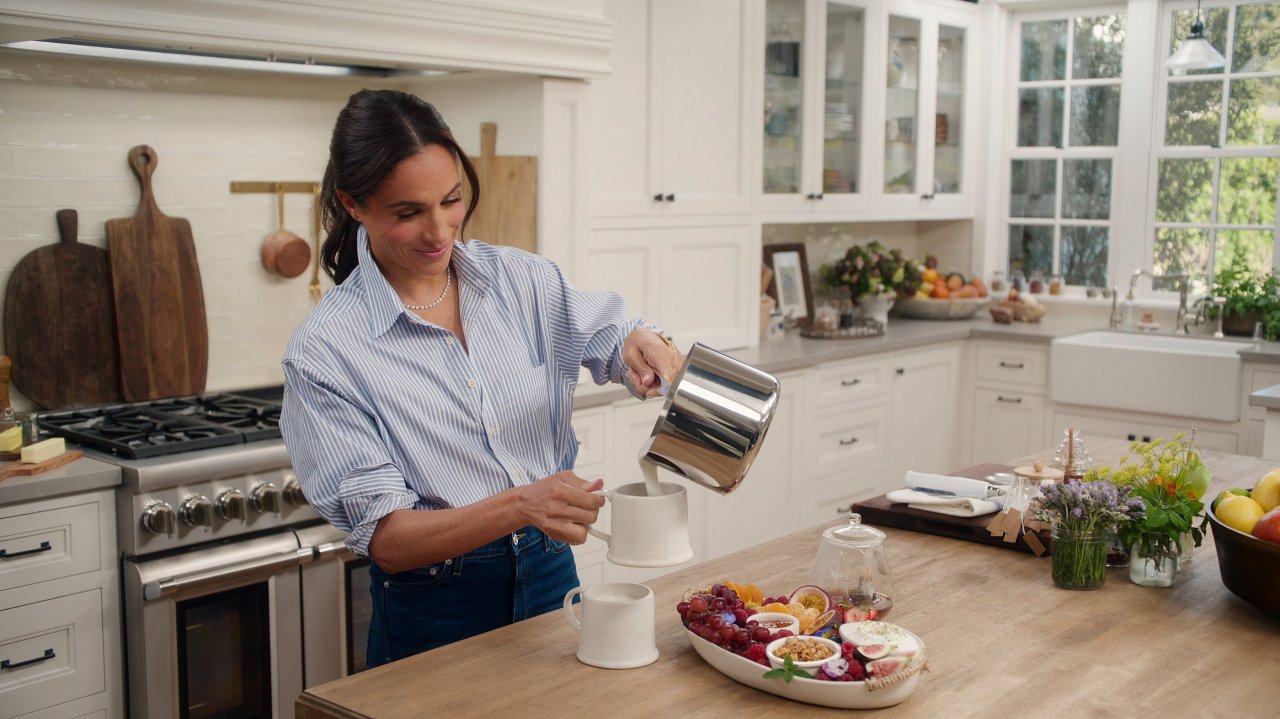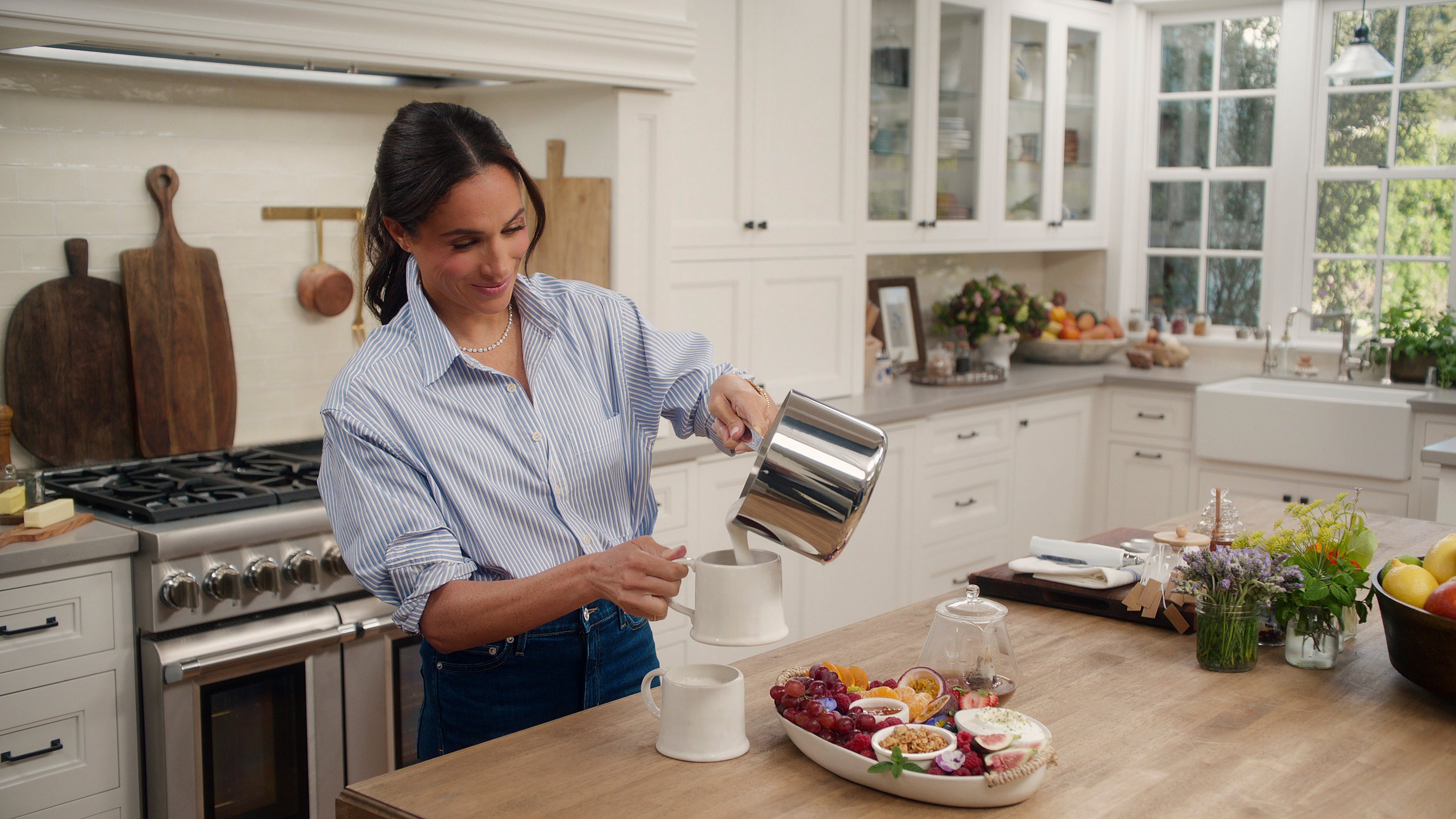The Duchess of Sussex has achieved something quite remarkable. After the brickbats hurled at the first season of her Netflix show With Love, Meghan – the furious pro-monarchy outrage, the eye-rolling from critics, the memes that lampooned her syrupy anecdotes – many TV personalities would have flinched. They would have called consultants, tweaked the format, apologised by going in a ‘new direction’. Meghan Markle (or should I say Sussex) has done the opposite. Season two arrived last month: unchanged, unrepentant and every bit as twee as the first.
Like her homemade ‘jam’, that’s not to say it’s gone down well. ‘Painfully contrived’, ‘irrelevant meets intolerable’ and ‘tone-deaf’ were just some of the newspaper reviews. Even the more Sussex-sympathising Independent gave the series one star. Many viewers, too, seem to have switched off: unlike her first series, which pulled in 5.3 million viewers across the globe, her second instalment has so far failed to break into Netflix’s coveted ‘top ten’.
Even so, Meghan’s saccharine stubbornness is precisely why she may yet succeed. Royal commentators and media critics alike have missed the key pull of her appeal. Her show isn’t for them. Instead, Meghan is carving out a space for a demographic long ignored, even shamed, by modern popular culture: the ordinary housewife.
For decades, western societies have been urging women to break out of the home: to be strong, independent and financially secure – and rightly so. But that narrative has produced an unintended side effect: those who remain in, or return to, the domestic sphere have been forgotten. To call yourself a ‘housewife’ in 2025 feels almost transgressive, a throwback to a stigmatised position. Those who do openly embrace the role have jazzed it up on social media, describing themselves as ‘trad wives’ while cooking photogenic food for their photogenic families, wearing a chequered apron and full face of make-up. On first glance, Meghan may seem like just another one of them. And yet, in her much-lampooned mediocrity, the duchess – knowingly or not – has offered a TV companion to the countless ordinary ‘trad wives’ in their kitchens at home.
In the 1990s and 2000s, women such as Martha Stewart and Ina Garten ruled the lifestyle airwaves. Nobody watched Martha Stewart Living or Barefoot Contessa to learn knife skills worthy of Le Cordon Bleu. These shows were about something else entirely: gentle companionship. To use Meghan’s favourite word, they showed us how to ‘elevate’ a weeknight dinner by adding a pinch of lemon zest to pasta or folding napkins into simple shapes. It was about doing something a little extra to change the domestic norm; simple victories without breaking a sweat.
Not every programme has to be a fine work of cinematography or thought-provoking masterpiece. Some exist just to keep you company while you chop onions or fold the laundry
Admittedly, Meghan hardly seems like their most natural successor. This is a former working royal after all, a self-proclaimed entrepreneur with a nine-bedroom mansion and Carolina Herrera ‘chef whites’. And yet her on-screen persona – derided on social media as ‘surface level’, ‘bland’ and ‘middle-class mum’ – is a classic American TV archetype. Despite her glamour, almost everyone knows a woman like her: pleasant to talk to but not someone you would engage with unless you have to for fear of ennui. She is boring, yes, but boring in a familiar, inoffensive way.
That’s what Meghan’s critics have missed. They judged With Love, Meghan, as though it were meant to showcase highbrow cookery, salacious celebrity chat or poignant insights into her life. They looked at her production team and multi-million-pound budget and cried ‘fake’. And yet that misses the point. With Love, Meghan is daytime comfort food. It wears its mediocrity with pride. At its root, it’s a show about a middle-aged, middle-class mum, yes, who doesn’t want her messy cupboards to be filmed.
I’ll admit, I was one of her critics when I watched the first series. It was all so laughable: the ‘working mum’ branding, the insipid stories, the flower sprinkles fit for a nursery class. But, now, I find myself oddly grateful the show wasn’t cancelled. Not every programme has to be a fine work of cinematography or thought-provoking masterpiece. Some exist just to keep you company while you chop onions or fold the laundry. I’ve watched season one three times over. I am savouring every last moment of my first watch of season two. When her Christmas special is released in December, I’ll crack open a bottle of her Napa Valley rosé and devour that, too.
The lesson, perhaps, is that sometimes blandness is a strength. Meghan is not a star of depth or complexity. She never has been, in any capacity, profound. Now, she has turned her back on the dizzying heights of royalty for the confines of a California kitchen, making mediocre food, doing preschool crafts, chatting politely with ‘friends’. Yes, it’s dull – yet she’s turned that very dullness into her brand. To millions of housewives, that’s almost inspiring.
She may never be admired, but her persistence may one day be appreciated. In an era of performative reinvention, Meghan has done something braver: she has chosen to remain boring. And, quietly, that may be the most interesting thing about her.








Comments